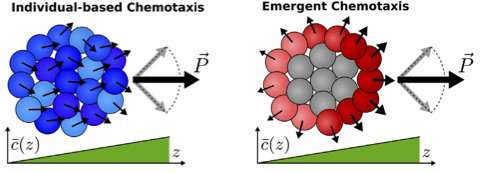Cells that specialize in groups function more effectively

Cells that specialize in groups track chemical gradients in their environment more precisely than individual cells, according to researchers at Purdue University.
Cells come together for collective migration in several processes, including organism development, wound healing and cancer metastasis. The simplest way for this to happen is by individual detection and response to a chemical attractant: each cell measures the difference in chemoattractant and moves in the direction of the gradient, while short-range coupling keeps the group together.
"Experiments suggest that in some cases, a new mechanism is emerging when cells get together as opposed to when they're by themselves. We wanted to compare the accuracy of one of these emergent mechanisms to when cells act individually while part of a group," said Andrew Mugler, an assistant professor of physics and astronomy at Purdue. "In particular, we wanted to know why they might have evolved this new mechanism – is there some advantage?"
There is. Cells that migrate as one-dimensional chains or two-dimensional sheets can detect gradients with a higher precision when they're specializing in a group rather than stuck together as individuals, according to the study.
Cells can't perfectly sense chemicals in their environment; there is always some error. When they come together in a group, they combine their sensory information, including errors. Individual cells working together in a group all contribute information and error, but in a group with the emergent mechanism, only the outer cells are sensory. This means there is less sensory information overall, but also less error, making that group better able to detect chemical gradients than their individually acting counterparts.
This emergent mechanism is also advantageous because if every cell in the group doesn't need to perform every task, they exert less energy performing essential functions. Only the cells on the outskirts of the group would have to work to move it, for example.
Understanding how emergent cooperative sensing works will give researchers insight into several biological processes, including cancer metastasis, said Mugler. He plans to conduct further studies on collective cell behavior.
More information: Julien Varennes et al. Emergent versus Individual-Based Multicellular Chemotaxis, Physical Review Letters (2017). DOI: 10.1103/PhysRevLett.119.188101
Journal information: Physical Review Letters
Provided by Purdue University





















